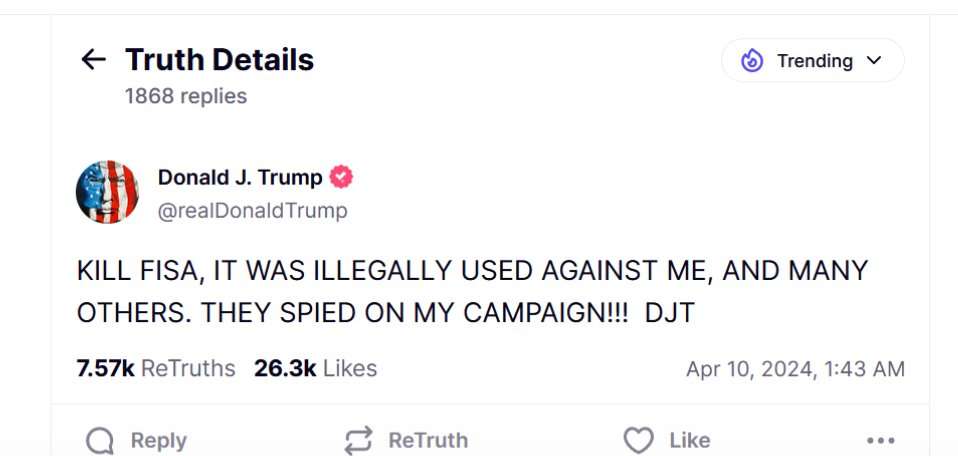
Spying stymied: The reauthorization of a warrantless electronic surveillance tool hit a snag in the House on Wednesday, as a group of Republicans revolted against Speaker of the House Mike Johnson's (R–La.) plan to bring the bill to the floor without guaranteeing the inclusion of key privacy-protecting reforms.
By a vote of 193–228, the House failed to approve a preliminary measure that would have set the terms of a floor debate over the renewal of Section 702 of the Foreign Intelligence Surveillance Act (FISA), which allows intelligence services to scoop up vast amounts of electronic communications between Americans and individuals overseas. The 19 Republicans who voted to sink the preliminary vote want to include a requirement that American law enforcement agencies get warrants before being allowed to access the Section 702 database to obtain information about American citizens.
Republican leaders promised to allow a floor vote on including the warrant requirement, but Rep. Chip Roy (R–Texas), one of the holdouts, told Roll Call that he was unwilling to support "a pre-cooked determination that we're not going to pass a warrant protection."
The need for reform should be fairly obvious: The FBI routinely uses the Section 702 database to troll through communications that have been "incidentally" collected from Americans who are not the targets of Section 702 surveillance. Even a White House advisory board has said the program lacks essential privacy protections.
Section 702 is set to expire on April 19 unless Congress votes to extend it. (For more on the fight over Section 702's reauthorization, check out this week's edition of Elizabeth Nolan Brown's newsletter, Sex & Tech.)
Weighing in: Both the American Civil Liberties Union (ACLU) and former President Donald Trump cheered the holdup of Section 702 reauthorization.
"Section 702 has been abused by the U.S. government for too long and the latest fight in the House only shows that Congress and the American people are fed up with the status quo," Kia Hamadanchy, senior policy counsel at the ACLU, said in a statement after Wednesday's House vote.
On Truth Social, Trump urged lawmakers to "KILL FISA" because it had been used to spy on his campaign.

Of course, it's worth noting that the last time Section 702 came up for reauthorization was in 2018—and Trump signed the bill to extend the spying authority without including any reforms.
What's next: The House will likely try again to pass the Section 702 reauthorization on Thursday or later this week. Johnson met with some of the holdout Republicans on Wednesday night and may court Democratic votes as well, Politico reports.
Iran draws a red line: If the United States helps Israel defend itself against a possible Iranian attack in the coming days, Iran will view American troops and other targets as fair game, The Intercept reported on Wednesday night, citing notes from a Tuesday meeting of the National Security Council.
That news came on the heels of a warning from American officials that an attack by Iran against Israel is imminent. Iran is seeking to retaliate for a strike by Israeli forces earlier this month that hit the Iranian embassy in Damascus, Syria.
Any additional escalation in the conflict between Israel and Iran would be a worrying step toward an all-out regional war. The possibility that U.S. troops will be targeted by Iran only heightens the risk of a growing conflict.
Despite that, Gen. Erik Kurilla, the top American military commander in the Middle East, is reportedly meeting Thursday with top Israeli military officials.
Terrible tariff: Trump's proposal to slap a 60 percent tariff on all imports from China would be a massive tax hike on Americans but could actually be a net negative for federal revenue too.
According to the Committee for a Responsible Federal Budget (CRFB), Trump's proposed tariff "would dramatically reduce trade with China (as intended) and thus lead to far less revenue than" some estimates have concluded without accounting for the decreased levels of trade.
"Despite the much higher tariff rates on remaining imports, tariff revenue on Chinese goods would fall from roughly $65 billion to $55 billion in FY 2035 under this scenario," the CRFB's analysis concludes. In other words, Trump's tariff would disrupt huge amounts of trade, make many products more expensive, and wouldn't even help reduce the budget deficit. That's a serious lose-lose-lose.
Scenes from Virginia: While hiking in Shenandoah National Park last weekend, I came across one of the small, old cemeteries that dot the landscape—remnants of the homesteads and small communities that once existed there.
This one included a reminder about the human cost of central planning. (You may need to click on the image to make it large enough to read clearly.)

The widespread use of eminent domain against private landowners is a little-known, dark chapter in the history of many of America's national parks. To create Shenandoah, the state of Virginia condemned hundreds of properties with the stroke of a pen: State lawmakers approved the Public Park Condemnation Act and then appointed a committee of three men to decide how much each landowner would be paid. Eminent domain was used to evict over 2,000 people who refused to leave voluntarily.
QUICK HITS
- Chicago cops fired 96 shots in 41 seconds and killed Dexter Reed, a black man, after pulling him over for failing to wear a seatbelt.
- Waymo began offering driverless taxi rides in Los Angeles on Wednesday.
- Today marks five years since Julian Assange was incarcerated in Great Britain.
- Georgia cops are still hassling vape stores over legal products like delta-8 and delta-10.
- Former President Donald Trump's latest attempt at postponing his Manhattan trial has failed.
- Americans are still not worried enough about the threat of global war.
- A government-enabled monopoly is responsible for the loss of 17,000 kidney transplants in the U.S. every year.
The post Come Back With a Warrant appeared first on Reason.com.







